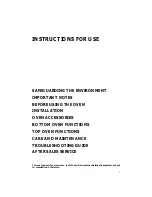
11.14
Defrost
• Remove the food packaging and put
the food on a plate.
• Use the first shelf position from the
bottom.
• Do not cover the food with a bowl or
a plate, as this can extend the defrost
time.
• For large portions of food place an
upturned empty plate on the bottom
of the oven cavity. Put the food in a
deep plate or dish and set it on top of
the plate inside the oven. Remove
shelf supports if necessary.
Food
Quantity
(kg)
Defrosting
time (min)
Further de-
frosting time
(min)
Comments
Chicken
1
100 - 140
20 - 30
Put the chicken on an upturned
saucer in a big plate. Turn halfway
through.
Meat
1
100 - 140
20 - 30
Turn halfway through.
Meat
0.5
90 - 120
20 - 30
Turn halfway through.
Trout
0.15
25 - 35
10 - 15
-
Strawber-
ries
0.3
30 - 40
10 - 20
-
Butter
0.25
30 - 40
10 - 15
-
Cream
2 x 0.2
80 - 100
10 - 15
Whip the cream when still slightly
frozen in places.
Gateau
1.4
60
60
-
11.15
Preserving - Bottom
Heat
• Use only preserve jars of the same
dimensions available on the market.
• Do not use jars with twist-off and
bayonet type lids or metal tins.
• Use the first shelf from the bottom for
this function.
• Put no more than six one-litre
preserve jars on the baking tray.
• Fill the jars equally and close with a
clamp.
• The jars cannot touch each other.
• Put approximately 1/2 litre of water
into the baking tray to give sufficient
moisture in the oven.
• When the liquid in the jars starts to
simmer (after approximately 35 - 60
minutes with one-litre jars), stop the
oven or decrease the temperature to
100 °C (see the table).
ENGLISH
31














































